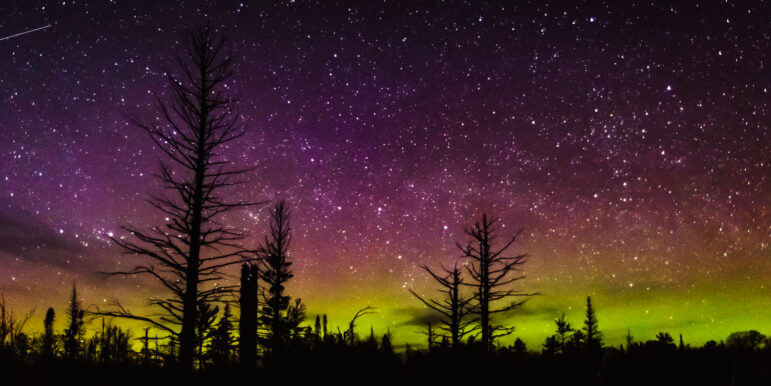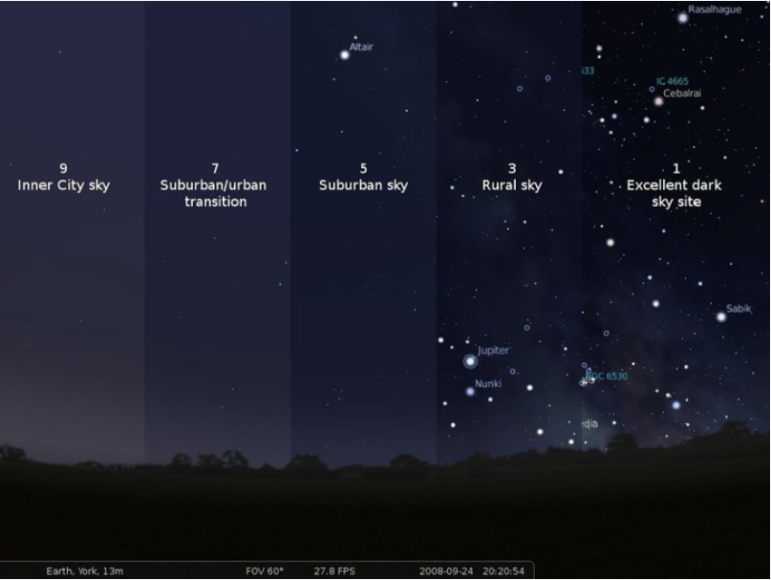
Nathan Bet
Keweenaw night sky.By MACKENZIE DeRAAD
Capital News Service
LANSING – The Keweenaw Mountain Lodge in the Upper Peninsula has been accepted into the International Dark-Sky Association, the third recognized dark sky park in the state.
Headlands International Dark Sky Park (established in 2011 in Mackinaw City) and the Dr. T.K. Lawless International Dark Sky Park (established in 2019 in Jones, Cass County) had been Michigan’s only internationally designated ones.
Such areas are becoming more popular in the United States as people become more interested in astrotourism experiences, according to park attendance figures and Alan Dyer, an astronomy writer and photographer and producer of planetarium programs for the TELUS Spark Science Centre in Alberta, Canada.
The Keweenaw Peninsula has seen a drastic increase in park attendance, likely due to its admittance to the International Dark-Sky Association.
“People have a bucket list of amazing sights they want to see, like the Northern Lights or the Milky Way,” Dyer told USA TODAY.
Dyer described the night sky as one of the many wonders of the world.
The night sky is less visible in urban settings because of the lights, so enthusiasts head to rural areas, like the U.P.
John Mueller, the interim general manager at the Keweenaw Mountain Lodge in Copper Harbor, said he hopes more dark sky parks will join in the near future.
“Right now there are two other Michigan international parks looking to join the association, but interesting enough because of certain legislation, state parks cannot join,” Mueller said.
Previous law said state parks recognized as dark sky areas couldn’t stay open past 10 p.m., putting a barrier between dark sky enthusiasts and night sky viewing.
“But, in the last two or three months, the laws changed and state parks designated as dark sky areas can now stay open later than 10 p.m.,” he said.
It looks like the legislation is moving in the right direction, Mueller said.
Although the process to join was rigorous, he says becoming part of the association was a great move for his lodge.
“This was a process we wanted to be part of,” Mueller said. “Becoming a part of the association, that was just the byproduct of doing a great job.”
He described the acceptance as a guiding force rather than an end goal.
“Even if it wasn’t worth it (to join), we’d still be doing it,” Mueller said, referring to astrotourism.
Stargazing is one of many ways people are connecting to nature, especially after the COVID-19 pandemic motivated people to spend more time outdoors.
Mueller says the lodge’s park has that “national park era” feel, like Acadia or Yellowstone.
The parks are working on creating light only in a manner that fosters dark skies, he added.
Light pollution is a major health concern, but the International Dark-Sky Association says that dark skies provide benefits to human health, like improving circadian rhythm and connections to nature.
The association’s CEO and executive director, Ruskin Hartley, said, “Unlike many other environmental issues facing the world, solving light pollution is straightforward, saves money and delivers immediate results.”
The association recognizes about 200 parks around the world. Many globally have reduced their light pollution and implemented dark sky programs.
There are six night-sky-protected state parks in Michigan, according to the Department of Natural Resources: Negwegon State Park in Alpena and Alcona counties; Wilderness State Park, southwest of Mackinaw City in Emmet County; Thompson’s Harbor State Park in Presque Isle County; Port Crescent State Park near Port Austin in Huron County; Lake Hudson Recreation Area in Lenawee County and Rockport State Recreation Area in Alpena and Presque Isle counties.
Elsewhere in the Great Lakes region, there are dark sky areas at Newport State Park in Wisconsin; Starry Skies Lake Superior and Aurora Summit in Minnesota; Geauga Observatory Park in Ohio; and Cherry Springs State Park in Pennsylvania.
Nighttime entry fees, if any, are minimal.
The Keweenaw Dark Sky Park has 24/7, 365-day access, with no check-in required. Stargazing is free, but lodging, workshops, food and beverages are not.
The Dr. T.K. Lawless International Dark Park charges $3 per car for stargazing.
Mackenzie DeRaad reports for Great Lakes Echo.

INHABITAT
Which skies make the best dark sky parks?